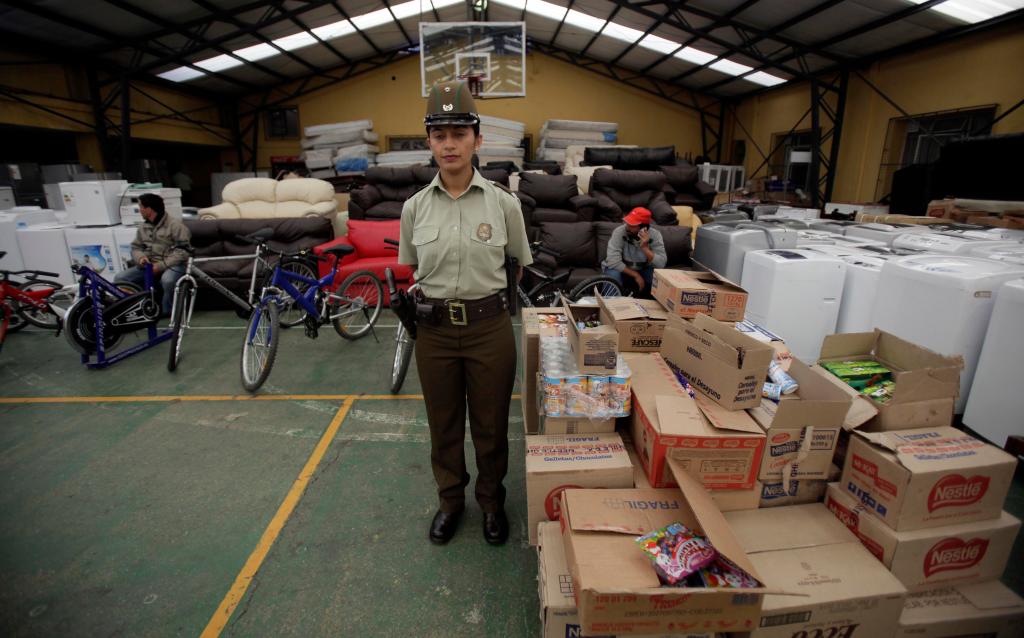CONCEPCION, Chile — The officers came with bullhorns to impoverished neighborhoods near the epicenter of Chile’s devastating earthquake, warning looters to return what they stole or face police raids.
And so they did, depositing everything from mattresses to refrigerators and flat-screen TVs. Together with looted merchandise recovered by police, the material is worth nearly $2 million, officers said.
Touring a police gym full of recovered goods Sunday, President Michelle Bachelet vowed that those responsible would feel the full weight of the law: prison terms of two to five years.
“These are items that have nothing to do with survival — they reflect the moral damage of the people, some of whom came just to find things they could make money from,” she said, adding that the government also will prosecute anyone responsible for price speculation.
Thousands of quake survivors participated in the looting, which grew to include grandmothers and small children. Outnumbered police could only stand and watch, urging people to take only the food they needed, until soldiers restored order.
The looting hampered rescue and recovery efforts by distracting firefighters and police and wounded the national pride of Chileans who yearn to be considered part of the First World.
“The damage it caused (to Chile’s international image) is lamentable. Now they’ll throw all of us in the same bag,” said Juan Lagos Rosales, a construction worker forced to sleep in a tent with his wife and baby girl outside their fallen house.
Some excuse the looting as a natural result of the wealth gap in Chile, where the poor are exposed to expensive consumer goods without any ability to buy them. The top 20 percent of wage earners make an average of $3,200 a month, compared to $340 a month for the bottom 20 percent, according to the national statistics institute.
When the earthquake shattered store windows, the temptation was too great, said the Rev. Luis Figueroa Vinet of the Our Lady of the Snows cathedral in Concepcion. “The pig isn’t guilty for what poverty brings,” he said, invoking a colorful Chilean adage about inequality.
But a poll Sunday suggests 85 percent of Chileans want the looters prosecuted.
Police Lt. Oscar Llanten credited the return of more than 950 items to members of the looters’ own communities, who tipped off officers.
Many Chileans squarely blame Bachelet for failing to stop the looting before it spread throughout the disaster area.
The survey sponsored by the daily newspaper El Mercurio found 72 percent believe the government responded late and inefficiently to re-establish order after the earthquake.
Sixty percent also believe aid delivery has been too slow and inefficient, according to the poll of 600 adults in Santiago, which had a margin of error of plus or minus 4 percentage points.
Bachelet did wait 33 hours after declaring a “state of catastrophe” before putting the military in charge of the disaster response, and significant aid didn’t reach some hard-hit communities for two or three days after the 8.8-magnitude earthquake and tsunami, which killed more than 450 people.
But the government has since deployed planes, ships, helicopters, trucks, heavy equipment and thousands of troops to deliver tons of aid from government storehouses, Chilean businesses and foreign governments and aid groups.
Some disaster veterans say Chile’s response has been remarkable, largely avoiding bureaucratic infighting and quickly patching up the international airport and main north-south highway to keep aid flowing.
“Could FEMA have done that?” said Chris Weeks, director of humanitarian affairs for the DHL delivery company, referring to the U.S. government’s disaster agency.
Chileans also are helping themselves: Complementing Chile’s intensive military aid, volunteers have appeared all over to deliver clothes and food, and a national telethon collected $58 million Saturday – twice what organizers hoped for.
That’s just a fraction of the estimated $12 billion to $30 billion needed – a huge amount for a country with an annual budget of $42 billion.
Send questions/comments to the editors.



Success. Please wait for the page to reload. If the page does not reload within 5 seconds, please refresh the page.
Enter your email and password to access comments.
Hi, to comment on stories you must . This profile is in addition to your subscription and website login.
Already have a commenting profile? .
Invalid username/password.
Please check your email to confirm and complete your registration.
Only subscribers are eligible to post comments. Please subscribe or login first for digital access. Here’s why.
Use the form below to reset your password. When you've submitted your account email, we will send an email with a reset code.